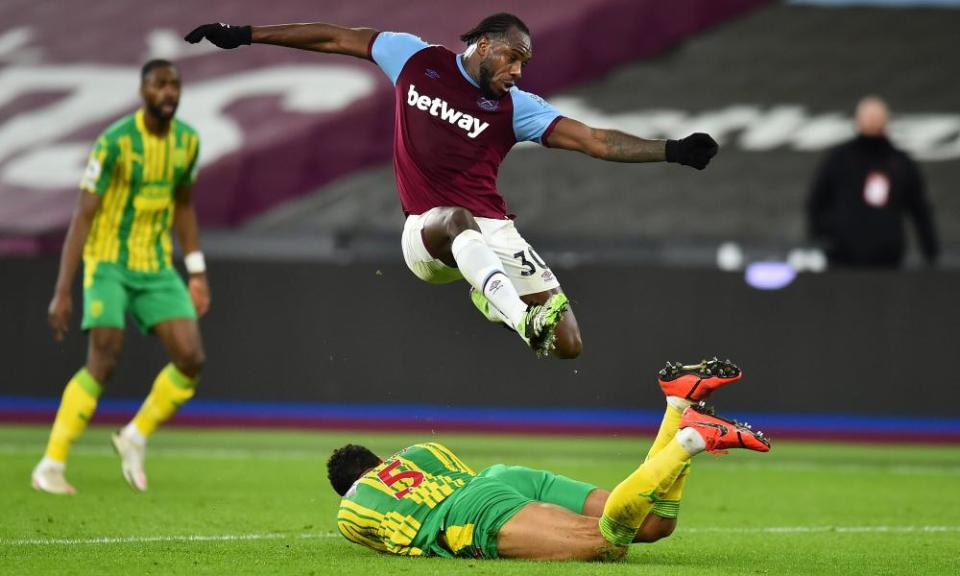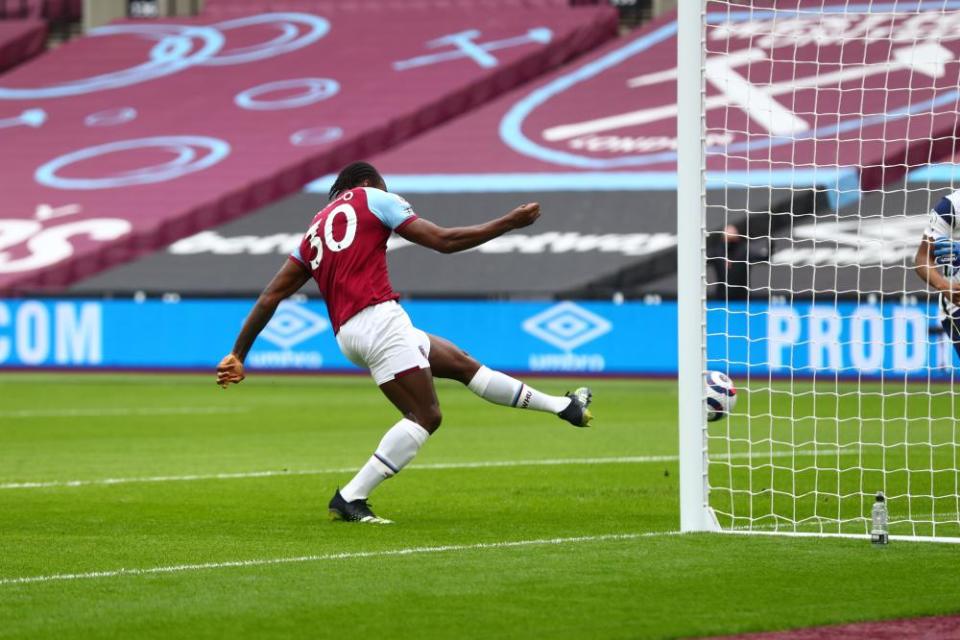Michail Antonio's West Ham evolution from utility man to star striker

For West Ham fans there are certain sentences that, regardless of context or circumstance, are basically guaranteed to bring you out in a cold sweat. “Roberto starts in goal.” “The owner’s just tweeted again.” But if you really want to conjure up that heady brew of exhilaration, anxiety and dread-soaked foreboding, then you will struggle to improve upon these seven words: “West Ham have signed a new striker”.
The revolving door of forwards signed in the 11 years that Davids Gold and Sullivan have been in charge of the club has been well-documented: from Championship makeweights (Nicky Maynard, Jordan Hugill) to established stars (Marco Borriello, Simone Zaza) to players you would swear were made up (Brian Montenegro, Wellington Paulista). Last month the club’s £45m record signing Sébastien Haller was sold to Ajax for £20m: a reminder that even in this most sparklingly successful of seasons, this has always been a club that remains true to its roots.
Related: West Ham’s striking failure: 32 signed in seven years and still no solution | Jacob Steinberg
The irony is that perhaps the best striker West Ham have unearthed in all that time wasn’t signed as a striker at all. Since joining the club from Nottingham Forest six years ago, Michail Antonio has played as a right-back, left-back, right-winger, left-winger, wing-back, second striker and more recently in the position where he is making the transition to the elite. With David Moyes’s team fourth in the table ahead of their trip to leaders Manchester City on Saturday, the forward play of Antonio has been one of the principal reasons for their success.
Six goals and three assists in an injury-hampered season (Antonio has played about half of West Ham’s minutes) are not the sole measure of his impact. Rather, it is his ability to offer multiple threats – in the air or on the ground, at pace or in tight spaces with his back to goal – that makes West Ham’s system work. Antonio does not have to score himself to be doing his job. Simply by providing an outlet, occupying defences, distracting and deforming them with his movement, he creates the space that Tomas Soucek and Jarrod Bowen, for example, have also found immensely to their liking.
For Antonio himself it has been quite the evolution: a definitive answer to the perennial question of how best to use a player of such unique and varied technical and physical gifts. Antonio doesn’t really fit any established template: a skilled dribbler with a phenomenal leap, a muscular target man with the sophisticated touch of a midfielder, the pace of a winger, the lungs of a full-back and the shrewd off-ball movement of a penalty-box poacher. “He gives us a different outlet,” Moyes has said. “He can run in behind or hold the ball up. He’s a physical presence, and his all-round play as a centre forward has improved greatly.”
And yet for much of his time in east London, Antonio’s versatility has felt as much a dilemma as an asset. Originally signed as a winger or wide midfielder, under Slaven Bilic he essentially ended up slotting in wherever they were short. “He can be a great right-back like Antonio Valencia of Manchester United,” said Bilic, who installed him in defence after an injury to Joey O’Brien. Though Antonio made a decent fist of it, it never quite felt like the right fit, either to the player himself or to West Ham
fans, one of whom started a change.org petition to get him reassigned.
It was after lockdown last year, with Haller injured, that Moyes started using Antonio more regularly as a striker. For Antonio, a player more used to facing goal and running at opponents, it was a switch that took some getting used to. The physicality wasn’t a problem: rather, it was training his feet to remain supple even while his body was bracing against impact. “I hated it at first,” Antonio told Sky Sports. “When you’ve got your back to play, they [defenders] come through the back of you. You’ve got to be
able to take that hit, and then control the ball, and then find the pass.”
Antonio’s goals – four against Norwich, 10 in total – were a key reason West Ham stayed up last season. This season, he has sharpened to an even finer point. Whereas in the past Antonio would often come short to link play or make sacrificial runs into the channels, this season he has concentrated more on conserving his energy and honing himself into a pure penalty-box striker. He touches the ball less than ever, and presses it less vigorously too. But when the ball arrives, he’s ready. All 42 of his Premier League goals have come from inside the box.

All this may have come a little late for his England ambitions. Antonio is 30, Gareth Southgate is well-stocked with attacking options and so perhaps it is little surprise that Antonio has expressed an interest in switching his allegiance to Jamaica ahead of a potential tilt at the 2022 World Cup. But in another sense Antonio’s tale is one of English football’s genuine success stories: a London-born teenager who never went to an elite academy and instead had to graft his way up through the ranks.
At Tooting and Mitcham United he would play in a tattered pair of JD Sports boots and supplement his £150-a-week wages by working as a lifeguard. Then came Reading, Sheffield Wednesday, Nottingham Forest. Now, finally, Antonio can look down from the upper reaches of the Premier League table: an elite striker who has never quite lost the restless hunger of his non-league days, a testament to ruthless adaptation in a ruthless business.

 Yahoo Finance
Yahoo Finance 